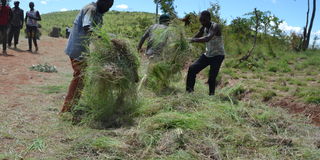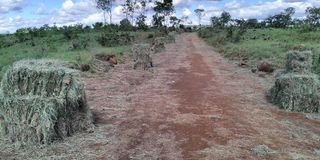Tharaka Nith Residents turn to selling grass following failed rains

Men spread grass to dry before making bales of hay at Kairini area in Tharaka Nithi County on June 27,2022.
Pushed by poverty due to rain failure, residents of the semi-arid Kithangani in Tharaka Nithi County have ventured into selling hay.
They cut the grass that grows naturally on their land and on 200 hectares of public land that is part of the Kairini hill and sell it for Sh100 per bale of 10kg.
The area in Igambang’ombe sub-county has not received enough rainfall to support crops for a few rainy seasons and residents could hardly afford basic needs until they discovered the new venture.
The Kairini area is mainly covered by grass and for many years, residents grazed their few livestock there and used it for house-thatching.
A few weeks before the onset of rains, residents would torch the ground so that soft grass could grow for their animals to feed on.

Bales of hay placed along a path in Kairini area in Tharaka Nithi County on June 27, 2022. The residents of the semi-arid area are earning a living out of the venture.
Mr Nicholas Mutegi is one of the hundreds of residents who now wake up every day and go to the field to cut grass. With the money he earns, he has been able to pay school fees for his two children in secondary school and feed his family.
He said that towards the end of last year, some locals started cutting grass and placing it along the Kirubia-Kairini road for travellers to buy. That is when some business people approached them and inquired whether they could harvest larger amounts.
They agreed and asked other residents to join them in the venture, which has become a source of income for many.
“[Many people here] rely on selling grass to feed their families and meet other needs,” Mr Mutegi told the Nation.
Most days he takes home Sh1,000 after selling 10 bales, money that he cannot earn as a casual labourer.
He said many men who had left the village to seek casual jobs in far-off places had returned home and are now earning a living from the fields.
To make work easier for them, they now use machines to make bales that weigh exactly 10kg.
Ms Lucy Karimi, another resident, said they have formed groups to address emerging concerns, including pricing and safety measures.
To ensure that the grass is not depleted, Ms Karimi said they plant more immediately after its rains. They also ensure it is cut and not uprooted so that it can regrow once rain falls.





